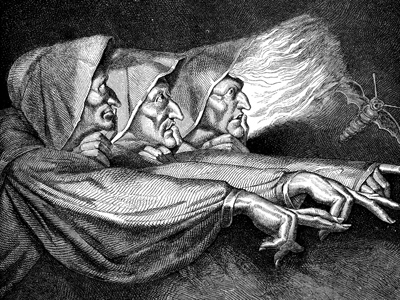
Macbeth - Illustrating and Supporting Points
This GCSE English Literature quiz about William Shakespeare's Macbeth will help you practise using evidence to support points. You can make your writing much more persuasive by producing and correctly referencing evidence from the text. Quoting specific details or paraphrasing parts of the text will make your argument stronger. This is one of the most important, and sometimes difficult, skills you can develop in studying English literature. After you have used a quotation, remember that the next sentence should explain how the quotation supports your point.
How to use evidence to support a point:
You will have learned in class the three key methods you can use in order to support a point with evidence. These are: paraphrasing, quoting single words or short phrases, or quoting longer sections of text.
Ready for more?
not all...
quizzers. Try to win a coveted spot on our Hall of Fame Page.







